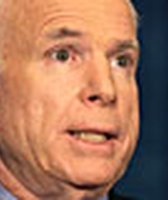Get PolitiFact in your inbox.
SUMMARY: Senators as candidates for president can be juicy targets for attack because they cast so many votes that can be easily mischaracterized. And that's what is happening to Sen. John McCain in an attack by the Democratic National Committee.
It's not easy being a senator running for president. Since Watergate, only one sitting senator — Democrat John Kerry of Massachusetts — has won his party's nomination.
One reason, perhaps, is what easy prey senators make for rivals and partisan interest groups. Given their lengthy voting records and recorded public speeches, it's almost like taking candy from a baby to find a single vote in a long Senate career that can be made to look like something it's not.
The Democratic National Committee struck just such a blow in March when it implied that GOP Sen. John McCain of Arizona was insincere in announcing that if elected he would seek to eradicate malaria in Africa. As the DNC pointed out in a news release, McCain voted against bills that would have increased funding for a global trust fund to combat HIV/AIDS, malaria and tuberculosis six times between 2001 and 2003. The clear implication was that McCain was a flip-flopper.
An open and shut case of hypocrisy? Not quite, as it turns out. Indeed, McCain did vote against the bills cited by the DNC. There is wide bipartisan support for the Global Fund to Fight AIDS, Tuberculosis and Malaria, a private partnership created by the world's wealthiest countries in 2002 at the suggestion of then-United Nations Secretary General Kofi Annan. The partisan dispute, in which McCain has become embroiled, centers on how much money to give the fund.
McCain has voted against Democratic proposals to increase funding more rapidly than most Republicans preferred, but in each case other factors, such as alternative approaches that were under consideration at the time and unrelated concerns over budgetary issues and bureaucratic capabilities, cloud the issue. Where McCain voted against one malaria funding bill, he mostly supported alternative measures, backed by his own party, that were somewhat less generous.
McCain hardly seemed like a senator opposed to malaria prevention in 2003, for instance, when he voted to authorize President Bush's plan to spend $15-billion over five years to combat it, as well as HIV/AIDS and tuberculosis. "The consequences of inaction in the face of a pandemic that threatens the global order call for the type of bold leadership reflected in this bill," he said at the time. "Our commitment must be sustained."
One 2001 vote cited by the DNC demonstrates best how some of the DNC examples take McCain's position on specific bills out of the true context, which was a mostly unanimous effort on Capitol Hill to target HIV/AIDS and malaria. The vote was on an amendment by Wisconsin Democratic Sen. Russ Feingold and would have boosted funding for AIDS and malaria prevention in Africa but at the same time would cut funding for Defense Department military procurement to pay for it. Many Democratic senators, including Hillary Rodham Clinton of New York, also voted against it; the amendment was defeated by an overwhelming majority.
In another example, the DNC failed to make clear the real reason McCain was in the opposition on both of the 2002 votes, which were on an emergency spending bill to combat terrorism. McCain voted against the bill on the grounds that it included too many provisions — malaria funding included — that had nothing to do with terrorism.
And in the case of the three 2003 votes cited by the DNC, Republicans at the time said they preferred alternative, albeit less generous, funding for malaria prevention for a number of reasons, arguing that Democratic amendments didn't include language to encourage donations from other countries, exceeded budget restrictions, and could have overwhelmed aid officials with so much money they wouldn't be able to disburse it wisely.
But if the attack on McCain seems unjustified, as a senator, he's at least used to it. In 2000, then-Texas Gov. George W. Bush ran radio ads in New York before that state's primary charging that McCain was against breast cancer research because he'd voted against funding for research at New York University and at a Long Island hospital. McCain, a longtime opponent of earmarked funding for local projects of all kinds — often derided in Washington as pork-barrel spending — said it wasn't breast cancer research he opposed, but rather the earmarking process, which doesn't allow senators to compare competing projects on their merits, but favors powerful interests and senators situated on the right congressional committees.
McCain's not the only presidential aspirant to suffer for his Senate record. John Kerry was accused by Bush of voting against funding for body armor for U.S. troops fighting in Iraq and Afghanistan during the 2004 campaign. In a television ad, the Bush campaign referenced Kerry's 2003 vote against a supplemental appropriation for the war on terrorism. But Kerry opposed the bill not because it included funding for body armor — a provision that Democrats had actually fought to include — but because of an unrelated dispute over how to pay for reconstruction efforts in Iraq and Afghanistan.
"If you're running for the White House as a senator you typically have 20 years of votes, and 20 years of having made speeches into the congressional record, of having had meetings with lobbyists," said Lilly Goren, an associate professor of politics at Carroll College in Wisconsin. "These things are part and parcel of the daily life of a senator, but sometimes they look strangely political."
Our Sources
Interview with Lilly Goren, associate professor of politics at Carroll College, April 1, 2008
Democratic National Committee press release, "FACT CHECK: McCain Voted Against Eradicating Malaria In Africa," March 26, 2008
Washington Post, "Bush Ads Hit McCain Stance On N.Y. Breast Cancer Programs" by Dan Balz and Terry M. Neal, March 2, 2000
Washington Post, "GOP Prism Distorts Some Kerry Positions," by Glenn Kessler and Dan Morgan, Sept. 3, 2004
CQ Weekly, "Triumph Now, Deal Later," by David Nather, Feb. 11, 2008
Statement by John McCain on the "United States Leadership Against HIV/AIDS, Tuberculosis and Malaria Act of 2003," May 16, 2003
Democratic National Committee news release, "FACT CHECK: McCain Voted Against Eradicating Malaria In Africa," March 26, 2008
U.S. Senate, Roll call vote #225 in 2001 Congressional Record debate on pages S7363, S7384-7387, S7407-7408
McCain press release, "McCain voices opposition to FY'02 Supplemental Appropriations Bill," July 24, 2002
U.S. Senate, Roll call vote #141 in 2003
U.S. Senate, Roll call vote #177 in 2003 , Congressional Record debate on pages S6445-6448
U.S. Senate, Roll call vote #332 in 2003 , Congressional Record debate on pages S11218-11221, S11225-11226
U.S. Senate, Roll call vote #429 in 2003 , Congressional Record debate on pages S13190-13192































